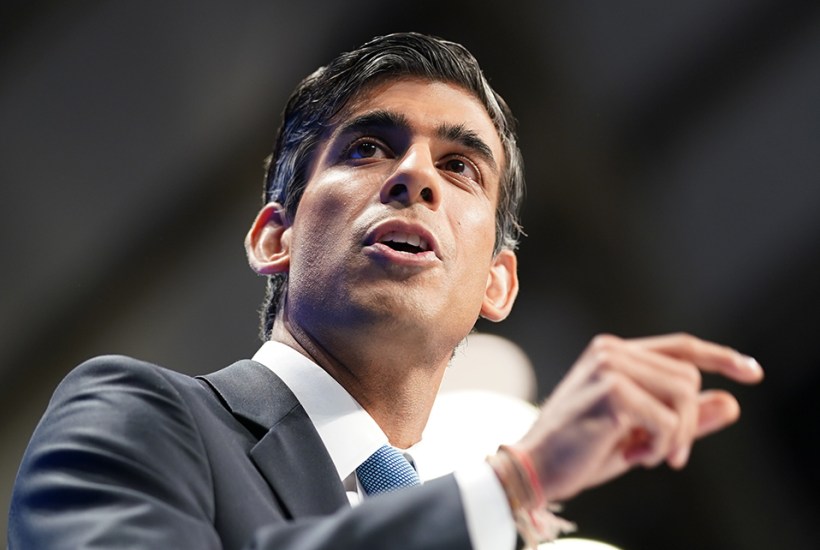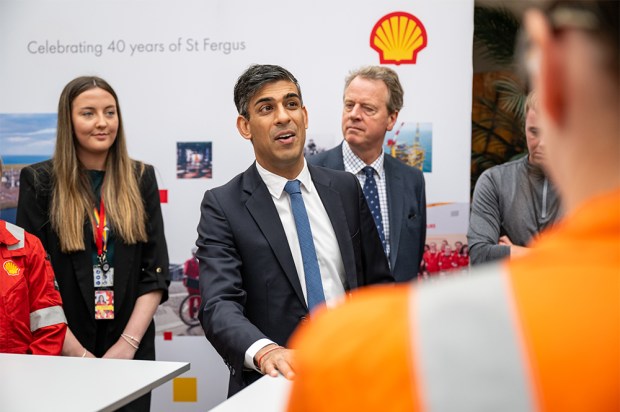The Conservatives gather in Manchester this weekend for what may well be their last hurrah as a governing party. Bookmakers are offering odds of 7:1 to anyone bold enough to bet on Rishi Sunak winning the next general election. The Prime Minister himself is in a gambling mood and has started to make some brave and overdue decisions: rethinking HS2 and overhauling net-zero policies. Such decisions bring short-term embarrassment, and were avoided by his predecessors, but they offer long-term dividends. The question is whether this is a wise strategy in the lead-up to an election.
Typically, a prime minister makes their big promises in a pre-election year. But Sunak recognises that short-termism has left Britain in a high-tax, low-growth trap and he hopes the public will appreciate his realism more than what he calls the ‘fairy tales’ of his Tory predecessors or Keir Starmer’s empty agenda. Sunak’s message is, in effect, that only the Tories can fix the mess created by the Tories, so vote Tory!
While Sunak’s new strategy isn’t without risks, it’s more likely to be successful than continuing with his old policy of managerialism. His ‘five pledges’ announced in January have been a flop – a mixture of unachievable (debt won’t fall, nor will small boats be stopped) and un-inspiring (most major countries will see inflation halve this year; most economies will grow). Had he consulted the Department of Health before making his pledge to cut the NHS waiting list, he would have been told that it will probably keep rising till Easter next year.
The ‘five pledges’ reeked of politics-by-focus group and reinforced the idea that Sunak is robotic and out of touch. Yet as chancellor, he was often prepared to take a stand in cabinet against the government’s biggest mistakes. He opposed HS2 and has always pointed out how many net-zero policies are so hard to deliver as to be borderline fraudulent. Perhaps Sunak’s evidence to the Covid inquiry will expand on how he tried to oppose lockdown, the worst policy disaster of our time, while others stayed silent.
By watering down Britain’s green commitments, Sunak has attracted the right kind of enemies: the hardline environmental campaigners, Labour mayors of badly run cities, corporates who were getting rich off net zero at the expense of taxpayers. Claire Coutinho, the new Energy Secretary, is right to say that he is a force for moderation in a climate debate that has swung to extremes. The 2030 deadline on petrol-car sales was utterly unworkable given the likely cost of electric vehicles and the national dearth of charging points. HS2 is unachievable in its current form (as the Infrastructure and Projects Authority recently ruled). Sunak has simply pointed out the obvious, and in doing so he has been attacked as populist, as is anyone who strays outside Westminster’s narrow idea of what is acceptable.
Sunak is drawing up a new battle plan. It’s easier for Starmer to accuse him of environmental vandalism than to admit to the economic vandalism that net zero would inflict on working-class communities. Since the Prime Minister has identified a disconnect between public opinion and the Westminster consensus on net zero, can he do the same on other issues? There are many matters – from migration to law and order to equality and diversity issues – where the political elites refuse to see that their orthodoxies do not hold sway over the population as a whole. One good example is the creep of identity politics through Britain’s institutions. Divisive ideologies which reduce everyone to their skin colour, religion or sexual orientation have led to workers being penalised and even sacked for failing to accept absurd claims about race or gender. Kemi Badenoch, the Business Secretary, has declared that the Conservatives are opposed to Critical Race Theory, but Sunak has so far been hesitant to comment. He should recognise that to challenge such ideology is to stand for tolerance and against a new kind of bigotry.
Another issue Sunak should put on the table is the question of the UK’s adherence to the European Court of Human Rights. Writing in this magazine, Lord Sumption raises important points about the Strasbourg court: Britain can uphold the values of the Convention of Human Rights with our own courts rather than stay under foreign judicial dysfunction. Also long overdue is a frank discussion about how the NHS has outgrown its bureaucratic structure and has become so unmanageable that it is constraining both doctors and patients.
The late Keith Joseph famously drew a distinction between the ‘centre ground’ of Westminster and the ‘common ground’ that the Conservative party can share with the country. The further Westminster strays from public opinion, the greater the opportunity for bold leaders. The question facing Sunak at next week’s conference is: how far is he prepared to go? He may risk being accused of populism, but what is populism in government other than the application of policies that are popular?
This conference will be perhaps Sunak’s last chance to establish himself as a leader who is prepared to break the mould. He cannot afford to waste it.
Got something to add? Join the discussion and comment below.
Get 10 issues for just $10
Subscribe to The Spectator Australia today for the next 10 magazine issues, plus full online access, for just $10.
You might disagree with half of it, but you’ll enjoy reading all of it. Try your first month for free, then just $2 a week for the remainder of your first year.














Comments
Don't miss out
Join the conversation with other Spectator Australia readers. Subscribe to leave a comment.
SUBSCRIBEAlready a subscriber? Log in